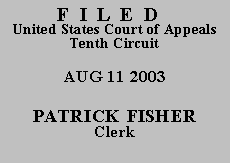

| UNITED STATES OF AMERICA,
Plaintiff-Appellee,
v.
LAWRENCE ROBERT CORTEZ,
also known as Tiny Defendant-Appellant. |
Nos. 02-2277 and 02-2298
(D.C. Nos. CR-01-112-JC and
CR-01-111-JC |
Pursuant to a plea agreement, Mr. Cortez pled guilty to superseding informations in two cases, each of which charged him with conspiring to possess and distribute cocaine. Following the recommendation of the presentence reports, the district court found that Mr. Cortez met the criteria of a career offender under U.S.S.G. § 4B1.1 based on prior convictions for aggravated battery and attempted cocaine trafficking. Career offender status elevated Mr. Cortez' criminal history category from IV to VI. Mr. Cortez' adjusted offense level was twenty-nine. On the government's motion, the district court departed downward to level twenty-four based on Mr. Cortez' substantial assistance. The resulting guideline range for his sentence was 100 to 125 months. The court sentenced him to 100 months in prison.
The career offender guideline requires, among other things, that the defendant have "at least two prior felony convictions of either a crime of violence or a controlled substance offense." U.S.S.G. § 4B1.1. Mr. Cortez asserts that his conviction for attempted cocaine trafficking does not constitute a "controlled substance offense." However, the guidelines commentary explains that the general definition of controlled substance offenses "include[s] the offenses of aiding and abetting, conspiring, and attempting to commit such offenses." U.S.S.G. § 4B1.2 comment. n. 1.
Mr. Cortez argues that the Sentencing Commission had no statutory authority to include attempt crimes in the definition of predicate offenses for career offender status. We considered this question in United States v. Allen, 24 F.3d 1180 (10th Cir. 1994), holding that the statutory grant of authority contained in 28 U.S.C. § 994(a) gave the Commission authority to include inchoate offenses such as attempt and conspiracy in the career offender guideline. Id. at 1186. We stated in Allen that "section 994(h) merely declares Congressional intent that the crimes described therein must subject the convicted defendant to enhanced penalties. Section 994(h) does not, by mandating enhancement for certain crimes, preclude the Commission from enhancing others if it is within the Commission's grant of discretion to do so." Id. (emphasis in original). Mr. Cortez acknowledges our holding in Allen, but asks us to revisit the question in light of the Supreme Court's opinion in United States v. LaBonte, 520 U.S. 751 (1997).
In LaBonte, the Court addressed the meaning of the term "maximum" in section 994(h). The Commission had amended the definition of maximum to mean the statutory maximum term before enhancements or adjustments. The Court held that this amended definition conflicted with the plain language of the statute. Id. at 757. Because Congress had instructed the Commission with the unambiguous term "maximum," the Commission could not redefine "maximum" to mean something less than its ordinary connotation required. To do so was contrary to what Congress had unequivocally instructed the Commission to do. By contrast, in this case as in Allen, the Commission's amendment including inchoate crimes as predicate offenses fulfills Congress' mandate without conflict. There is nothing in the enabling statute to preclude the Commission from expanding the definition of a career offender. LaBonte is clearly distinguishable from and not inconsistent with our holding in Allen. In the absence of a superseding decision by the Supreme Court, one panel cannot overrule another panel, so we decline to revisit Allen. See In re Smith, 10 F.3d 723, 724 (10th Cir. 1993) (per curiam).
The Commission acted within its authority to include inchoate offenses as predicates for career offender status. The district court properly counted Mr. Cortez' conviction for attempted cocaine trafficking toward his career offender status.
Accordingly, we AFFIRM.
ENTERED FOR THE COURT
Stephanie K. Seymour
Circuit Judge
*.After examining appellant's brief and the appellate record, this panel has determined unanimously that oral argument would not materially assist the determination of this appeal. See Fed. R. App. P. 34(a)(2) and 10th Cir. R. 34.1(G). The case is therefore submitted without oral argument. This order and judgment is not binding precedent except under the doctrines of law of the case, res judicata and collateral estoppel. The court generally disfavors the citation of orders and judgments; nevertheless, an order and judgment may be cited under the terms and conditions of 10th Cir. R. 36.3.